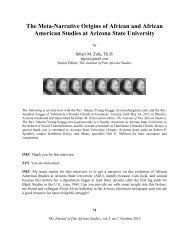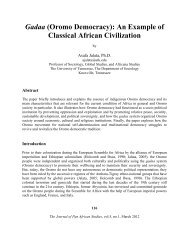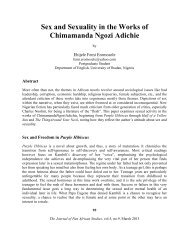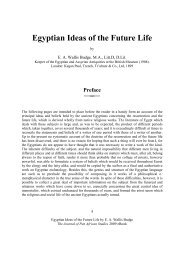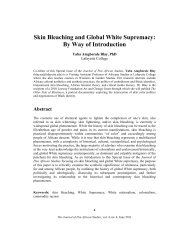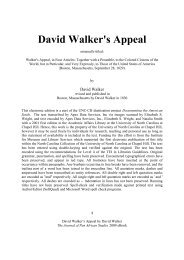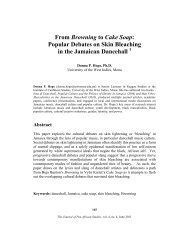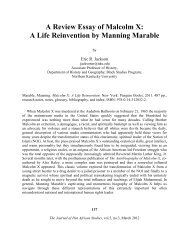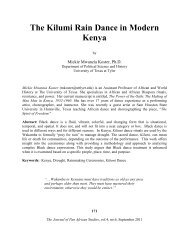African Centered Text (1990-2000): A Decade of Protracted ...
African Centered Text (1990-2000): A Decade of Protracted ...
African Centered Text (1990-2000): A Decade of Protracted ...
Create successful ePaper yourself
Turn your PDF publications into a flip-book with our unique Google optimized e-Paper software.
<strong>African</strong> <strong>Centered</strong> <strong>Text</strong> (<strong>1990</strong>-<strong>2000</strong>):<br />
A <strong>Decade</strong> <strong>of</strong> <strong>Protracted</strong> Engagement<br />
by<br />
Itibari M. Zulu, Th.D.<br />
imzsr@yahoo.com<br />
Senior Editor, The Journal <strong>of</strong> Pan <strong>African</strong> Studies;<br />
Provost, Amen-Ra Theological Seminary<br />
Introduction<br />
The following is an annotated bibliography <strong>of</strong> eighty <strong>African</strong> centered books on <strong>African</strong> religions,<br />
philosophy, cultural history and spirituality, published between <strong>1990</strong> and <strong>2000</strong> (organized in<br />
alphabetical order by author/editor, title, publisher, place <strong>of</strong> publication, and date).<br />
The premise <strong>of</strong> this exercise is that <strong>of</strong>ten in our rush to define, defend and develop the particulars<br />
<strong>of</strong> Afrocentricity and the <strong>African</strong> centered paradigm, we assume that all have read or are at least<br />
familiar with some <strong>of</strong> the key text in Africology. However, to our surprise, many have limited<br />
familiarity. To help solve this challenge, this non-exhaustive and introductory bibliography is<br />
designed to 1) provide an introduction to work in print addressing <strong>African</strong> world religion,<br />
philosophy, and spirituality, 2) encourage critical reading, discourse, and thinking within the<br />
<strong>African</strong> centered paradigm, and 3) to introduce space for a more systematic examination <strong>of</strong><br />
<strong>African</strong> centered literature.<br />
Interest in print sources on traditional and ancient <strong>African</strong> religions, philosophy and spiritualities<br />
seem to have blossomed during the <strong>1990</strong>s, yet the genesis stem from the work <strong>of</strong> pr<strong>of</strong>essor John<br />
S. Mbiti in his classic book, <strong>African</strong> Religions and Philosophy published in 1969, representing<br />
the first popular and systematic study <strong>of</strong> <strong>African</strong> religions and philosophy from an <strong>African</strong><br />
perspective, and the first work to significantly challenge Christian assumptions about traditional<br />
<strong>African</strong> religious ideas. And second, from the placing <strong>of</strong> <strong>African</strong> people at the center <strong>of</strong> any<br />
analysis <strong>of</strong> <strong>African</strong> phenomena via the theoretical construct <strong>of</strong> Afrocentricity, as articulated by<br />
pr<strong>of</strong>essor Molefi Kete Asante in Afrocentricity: The Theory <strong>of</strong> Social Change (1980, 2003). This<br />
acknowledgement is important as we make room for a more systematic examination <strong>of</strong> <strong>African</strong><br />
centered literature, and demonstrate the ongoing history and dynamics <strong>of</strong> the <strong>African</strong> centered<br />
text.<br />
41<br />
The Journal <strong>of</strong> Pan <strong>African</strong> Studies, vol.3, no.10, September 2010
Addae, Erriel K<strong>of</strong>i (Erriel D. Roberson), ed. To Heal A People: <strong>African</strong> Scholars Defining a<br />
New Reality. Columbia, MD: Kujichagulia Press, 1996.<br />
A collection <strong>of</strong> ten essays working to define an independent <strong>African</strong> centered discourse on<br />
science, spiritual awareness, psychology, cosmology, cultural renewal and education.<br />
Contributors to the collection include Marimba Ani, Mwalimu Shujaa, Kwaku Kushinda, Na’im<br />
Akbar, Asa G. Hillard III, and others.<br />
Akbar, Na'im. Light from Ancient Africa [forward by Wade W. Nobles]. Tallahassee, FL: Mind<br />
Productions & Associates, 1994.<br />
An insight into the human psyche through ancient Kemetic tradition arguing that the human<br />
being is transpersonal and inevitably connected to the divine and everything in nature. The work<br />
investigates the origins and dimensions <strong>of</strong> Kemetic psychology, the discovery <strong>of</strong> the self, and the<br />
spiritual legacy <strong>of</strong> Rameses.<br />
Amen, Ra Un Nefer. Metu Neter, Vol. 1: The Great Oracle <strong>of</strong> Tehuti and the Egyptian System<br />
<strong>of</strong> Spiritual Cultivation. Brooklyn, NY: Khamit Corporation, <strong>1990</strong>.<br />
A review <strong>of</strong> ancient Kemetic: spiritual awareness, destiny, evolution stages (Sahu, Ab, Ba), ten<br />
stages <strong>of</strong> initiation, Maatian principles, four levels and ten states <strong>of</strong> meditation, mediumistic<br />
trance, deities <strong>of</strong> the Metu Neter, cosmology, cosmogony, the philosophical and psychological<br />
aspects <strong>of</strong> the Metu Neter oracle system and a guide on how to meditate and perform a ritual.<br />
Amen, Ra Un Nefer. Metu Neter, Vol. 2: Anuk Ausar, The Kemetic Initiation System.<br />
Brooklyn, NY: Khamit Corporation, 1994.<br />
A guide to achieve spiritual perfection and success based on the ancient Kemetic system <strong>of</strong> ten<br />
initiation stages. The principles and processes <strong>of</strong> initiation are explained utilizing Ausarian<br />
religion (i.e., observances and practices designed to guide one to a life <strong>of</strong> success) to obtain a<br />
harmonious human social order. The volume includes an index, and an appendix <strong>of</strong> illustrations<br />
and chants.<br />
42<br />
The Journal <strong>of</strong> Pan <strong>African</strong> Studies, vol.3, no.10, September 2010
Amen, Ra Un Nefer. Tree <strong>of</strong> Life Meditation System (TOLM): General Principles <strong>of</strong> Holistic<br />
Meditation. Brooklyn, NY: Khamit Corporation, 1996.<br />
Using the eleven hidden powers <strong>of</strong> the spirit <strong>of</strong> ancient Kemet, this work guides one through a<br />
twenty-one day meditation process (consciousness) involving the ability to: remain peaceful in<br />
the midst <strong>of</strong> great difficulties, unify all aspects <strong>of</strong> human life, avoid and solve all conflicts,<br />
overcome all difficulties, meet all objectives, protect ourselves when unprotected, establish and<br />
maintain control over our lower behavior, awaken and direct our emotions and subconscious via<br />
imagination, awaken and direct our emotions and subconscious via intellect, and develop our<br />
foresight and ability to access our vitality and health to meet our objectives.<br />
Ani, Marimba. Yurugu: An <strong>African</strong> <strong>Centered</strong> Critique <strong>of</strong> European Cultural Thought and<br />
Behavior. Trenton, NJ: <strong>African</strong> World Press, 1994.<br />
This work exposes the dynamics <strong>of</strong> white world supremacy as it examines European cultural<br />
thought and behavior in ten chapters. Critical thinkers in the <strong>African</strong> centered community have<br />
praised this work for its ability to awaken the <strong>African</strong> mind to the evils <strong>of</strong> destructive white<br />
thought and action.<br />
Asante, Molefi Kete and Abu S. Abarry, eds. <strong>African</strong> Intellectual Heritage: A Book <strong>of</strong><br />
Sources. Philadelphia: Temple University Press, 1996.<br />
This reference volume provides a comprehensive guide to sources on the <strong>African</strong> world<br />
community experience from ancient history to the Million Man March to assist in the<br />
construction <strong>of</strong> an <strong>African</strong> intellectual canon. The text is divided in six thematic sections, and by<br />
far, the best text <strong>of</strong> its kind. The work includes a chronology, index, bibliography, and a glossary.<br />
Asante, Molefi Kete. The Afrocentric Idea. (revised and expanded edition) Philadelphia: Temple<br />
University Press, 1998.<br />
This work forms an Afrocentric theoretical critique <strong>of</strong> imperialistic Eurocentric orientations and<br />
injects the agency <strong>of</strong> <strong>African</strong> people and culture into the equation <strong>of</strong> social and political<br />
transformation. Hence, the work address: ideological assumptions and misinterpretations <strong>of</strong> the<br />
Afrocentric idea, communication theory, the function <strong>of</strong> speech, the character <strong>of</strong> audience in the<br />
<strong>African</strong> concept <strong>of</strong> rhetoric from the Akan <strong>of</strong> Ghana, Afrocentric themes <strong>of</strong> transcendent<br />
discourse, the functions <strong>of</strong> an Afrocentric paradigm in advancing <strong>African</strong> Studies, and other<br />
topics.<br />
43<br />
The Journal <strong>of</strong> Pan <strong>African</strong> Studies, vol.3, no.10, September 2010
Asante, Molefi Kete. Kemet, Afrocentricity and Knowledge. Trenton, NJ: Africa World Press,<br />
<strong>1990</strong>.<br />
This work rest on the idea that Africalogy (the Afrocentric study <strong>of</strong> phenomena, events, ideas,<br />
and personalities related to Africa) is a discipline and has its theoretical foundations (principal<br />
issues <strong>of</strong> inquiry) in <strong>African</strong> cosmological, epistemological, aesthetic and axiological<br />
understandings. Throughout the book, an Africalogical paradigm juxtaposes discourse on the<br />
legacy <strong>of</strong> ancient Kemet, the rhetorical principles <strong>of</strong> Maat, contiguous critique, and other<br />
perspectives.<br />
Asante, Molefi Kete. Malcolm X as Cultural Hero & Other Afrocentric Essays. Trenton, NJ:<br />
Africa World Press, 1993.<br />
A collection <strong>of</strong> twenty essays on: the Afrocentric school <strong>of</strong> thought examining Malcolm X as a<br />
cultural hero, Afrocentric axiom formation (i.e., power resides in how close we are to our<br />
cultural center), book critiques, the question <strong>of</strong> time and space control from C. Tsehloane Keto’s<br />
construct, analogy flaws <strong>of</strong> Arthur Schlesinger, the subject fields and paradigmatic approaches <strong>of</strong><br />
Africalogy, a proposal for six large states in Africa to advance economic and social progress, and<br />
<strong>African</strong> centered communication theory detailing systematic meta-theory.<br />
Asante, Molefi Kete. The Painful Demise <strong>of</strong> Eurocentrism: An Afrocentric Response to<br />
Critics. Trenton, NJ: Africa World Press, <strong>2000</strong>.<br />
This work provides a response to the critics <strong>of</strong> Afrocentricity, thus the author engages Stephen<br />
Howe, Mary Lefkowitz, Kwame Anthony Appiah, and others to demonstrate that their principal<br />
problem is their disbelief in the agency <strong>of</strong> <strong>African</strong> people to create society, community, culture<br />
and civilization. Hence, Asante also challenges the basic arguments <strong>of</strong> the critics, and reiterates<br />
the correctness <strong>of</strong> the Afrocentric vision.<br />
Ashby, Muata Abhaya and Karen Asha Clarke-Ashby. The Mystical Teachings <strong>of</strong> the Ausarian<br />
Resurrection : Initiation into the Third Level <strong>of</strong> Shetava Asar. Miami, FL: Cruzian Mystic<br />
Books, 1997.<br />
This volume details the myth <strong>of</strong> the Ausarian (Osirian) Resurrection, the story <strong>of</strong> Osiris, Isis,<br />
Horus (Heru) and Set, and it's mystical implications for achieving a state<strong>of</strong> supreme peace, hetep.<br />
Insight is given as to how these spiritual teachings can be applied and practiced in one's daily<br />
life.<br />
44<br />
The Journal <strong>of</strong> Pan <strong>African</strong> Studies, vol.3, no.10, September 2010
Azibo, Daudi Ajani ya, ed. <strong>African</strong> Psychology in Historical Perspective & Related<br />
Commentary. Trenton, NJ: Africa World Press, 1996.<br />
A selection <strong>of</strong> fourteen essays on research in the emerging discipline <strong>of</strong> Africentric psychology<br />
with content on: the nature <strong>of</strong> human nature through <strong>African</strong> thought, an Africentric approach to<br />
mental health, the question <strong>of</strong> ‘mentacide’, psychotherapy, educational psychology, curriculum<br />
development, pedagogy and other topics.<br />
Badejo, Diedre. Osun Seegesi: The Elegant Deity <strong>of</strong> Wealth, Power, and Femininity. Trenton,<br />
N.J.: Africa World Press, 1995.<br />
A report on ritual orature, sacred song and festival drama <strong>of</strong> the Yoruba goddess Osun Seegesi at<br />
her principal shrine in Osogbo, Nigeria, demonstrating gender reciprocal harmony building, and<br />
healthy relationships.<br />
Baker-Fletcher, Garth Kasimu, ed. Black Religion After the Million Man March: Voices <strong>of</strong> the<br />
Future. NY: Orbis Books, 1998.<br />
A collection <strong>of</strong> sixteen articles on the Million Man March (MMM) written by <strong>African</strong> American<br />
men and women in celebration and critique <strong>of</strong> the MMM with an eye on the event and movement<br />
in relationship to Black religion. Topics and issues include: the spirituality <strong>of</strong> Heru, Black<br />
masculinity, motifs <strong>of</strong> the MMM, the question <strong>of</strong> women, Spike Lee's film, the MMM pledge,<br />
the MMM in context <strong>of</strong> a healing space, the role <strong>of</strong> Minister Farrakhan, non-sexist space for<br />
Black men, and other topics.<br />
ben-Jochannan, Yosef. <strong>African</strong> Origins <strong>of</strong> Major ‘Western Religions’: The Black Man’s<br />
Religion Volume I. Baltimore, MD: Black Classic Press, 1991.<br />
A classic work [first published in 1970] shows the link between Judaism, Christianity, and Islam<br />
and indigenous <strong>African</strong> religions. The author reports: the early fathers <strong>of</strong> the Christian church<br />
were men <strong>of</strong> Africa who made Christianity a viable religion, the grandfather <strong>of</strong> Mohammed was<br />
<strong>of</strong> <strong>African</strong> origin, the co-founder <strong>of</strong> Islam was an <strong>African</strong> from Ethiopia, and how the Kemetic<br />
Confessions <strong>of</strong> Innocence and the Ten Commandments <strong>of</strong> the Bible are similar, although the<br />
Kemetic text pre-date the Ten Commandments by at least a thousand years.<br />
45<br />
The Journal <strong>of</strong> Pan <strong>African</strong> Studies, vol.3, no.10, September 2010
Brandon, George. Santeria From Africa to the New World: The Sell Memories. Bloomington:<br />
Indiana University Press, 1993; 1997.<br />
An examination <strong>of</strong> Santeria with an introductory section on Africa, a review <strong>of</strong> Creole culture,<br />
Catholicism, the struggle <strong>of</strong> Yoruba religion in Cuba from 1492 to 1959, and Santeria (Orisha-<br />
Voodoo) in New York through Oba Adefunmi I and Cuban/Puerto Rican santeros.<br />
Brock-Utne, Birgit. Whose Education for All? The Recolonization <strong>of</strong> the <strong>African</strong> Mind. New<br />
York: Routledge, <strong>2000</strong>.<br />
Since <strong>1990</strong>, when the phrase "education for all" was first coined at the World Bank conference in<br />
Jomtien, Thailand, a battle has raged over its meaning and its impact on education in Africa. In<br />
this volume, the author argues that "education for all" really means "Western primary schooling<br />
for some and none for others"; and demonstrates how this construct robs <strong>African</strong> people <strong>of</strong> their<br />
indigenous knowledge and language, starves higher education in Africa, and thereby perpetuates<br />
Western dominion.<br />
Brooks, Miguel F., ed. Kebra Nagast (The Glory <strong>of</strong> Kings): The True Ark <strong>of</strong> the Covenant.<br />
Trenton, N.J.: Africa World Press, 1996.<br />
An edited and translated work (originally recorded in the ancient Ethiopian language, Ge'ez, by<br />
anonymous scribes) asserting that the lost chest, ‘the Ark <strong>of</strong> the Covenant’ containing the Ten<br />
Commandments is in Ethiopia and pages from the original Kebra Nagast, a book <strong>of</strong> ancient<br />
secrets and truths was removed by royal decree from the authorized 1611 Kings James version <strong>of</strong><br />
the Bible.<br />
Browder, Anthony T [introduction by John Henrik Clarke]. Nile Valley Contributions to<br />
Civilization: Exploding the Myths Volume 1. Washington, D.C.: The Institute <strong>of</strong> Karmic<br />
Guidance, 1992.<br />
An illustrated introduction to the historical accomplishments <strong>of</strong> ancient Kemet, and a discussion<br />
<strong>of</strong> deliberate attempts to Europeanize its history and conceal its contribution to early American<br />
and European culture.<br />
46<br />
The Journal <strong>of</strong> Pan <strong>African</strong> Studies, vol.3, no.10, September 2010
Bynum, Edward Bruce [forward Linda James Myers]. The <strong>African</strong> Unconscious: Roots <strong>of</strong><br />
Ancient Mysticism and Modern Psychology. New York: Teachers College Press, 1999.<br />
A comparative study <strong>of</strong> psychology and mysticism using science and ethnology to reveal the<br />
<strong>African</strong> origins <strong>of</strong> human consciousness via discourse on <strong>African</strong> religions, the dynamics <strong>of</strong><br />
possession, Kemetic philosophy, and the parallels between Jewish mystical thought and ancient<br />
Kemet.<br />
Carruthers, Jacob H [forward by John Henrik Clarke]. Mdw Ntr: Divine Speech (A<br />
Historiographical Reelection on <strong>African</strong> Deep Thought From the Time <strong>of</strong> Pharaohs to the<br />
Present). London: Karnak House, 1995.<br />
An investigation <strong>of</strong> the role <strong>of</strong> <strong>African</strong> thought, and the function <strong>of</strong> divine speech wherein the<br />
author calls for the champions <strong>of</strong> <strong>African</strong> thought (deep thought) to listen to the voices <strong>of</strong> the<br />
ancestors, and avoid false and restrictive Eurocentric philosophical ideas.<br />
Chevannes, Barry, ed. Rastafari and Other <strong>African</strong>-Caribbean Worldviews. New Brunswick,<br />
NJ: Rutgers University Press, 1998.<br />
A collection <strong>of</strong> essays by seven leading scholars in Caribbean anthropology focused on Rastafari<br />
as resistance; Revivalism; Rastafari beliefs; the origin and symbolism <strong>of</strong> dreadlocks; Surinamese<br />
creole women’s discourse on possession and therapy; and <strong>African</strong> institutions in the West Indies.<br />
The book also provides an index, bibliographical references, and a glossary.<br />
Collier-Thomas, Bettye. Daughters <strong>of</strong> Thunder: Black Women Preachers and Their Sermons,<br />
1850-1979. San Francisco: Jossey-Bass, 1998.<br />
The result <strong>of</strong> two decades <strong>of</strong> research, this work explores the history <strong>of</strong> <strong>African</strong> American<br />
women preachers and issues and struggles they confronted in their effort to be ordained and<br />
function as ministers.<br />
47<br />
The Journal <strong>of</strong> Pan <strong>African</strong> Studies, vol.3, no.10, September 2010
Cone, James H. Risk <strong>of</strong> Faith: The Emergence <strong>of</strong> a Black Theology <strong>of</strong> Liberation, 1968-1998.<br />
Boston, MA: Beacon Press, 1999.<br />
A collection <strong>of</strong> reflective essays by the leading architect Black liberation theology representing<br />
thirty years <strong>of</strong> “searching for the truth <strong>of</strong> the gospel”. Topics in this work include: the birth <strong>of</strong><br />
Black theology; the theological dimensions <strong>of</strong> <strong>African</strong> American spirituals; the theology <strong>of</strong><br />
Martin Luther King, Jr.; the philosophy <strong>of</strong> Malcolm X; Black theology and the <strong>African</strong> American<br />
church; a critique <strong>of</strong> white theology; and Black middle-class estrangement from the Black<br />
church. The text also includes an index and bibliographical notes.<br />
Conyers, James L., ed. <strong>African</strong>a Studies: A Disciplinary Quest for Both Theory and Method.<br />
Jefferson, NC: McFarland & Company, 1997.<br />
A collection <strong>of</strong> sixteen essays on the administrative and organizational structures in <strong>African</strong>a<br />
Studies, <strong>African</strong>a womenist studies and cultural aesthetics based on a National Council for Black<br />
Studies summer institute discourse held at Ohio State University in 1991. Some <strong>of</strong> the<br />
contributors include Delores Aldridge (<strong>African</strong>a womanism), James Turner (epistemology),<br />
William E. Nelson (Africology), and Molefi Kete Asante (Afrocentric methodology).<br />
Dash, Michael I. N., Jonathan Jackson and Stephen C. Rasor. Hidden Wholeness: <strong>African</strong><br />
American Spirituality for Individuals and Communities. Cleveland, OH: United Church Press,<br />
1997.<br />
An exploration <strong>of</strong> <strong>African</strong> and <strong>African</strong> American spirituality involving liberating encounters<br />
reflection and actions to facilitate a holistic community. The thesis contends that spirituality<br />
fosters joy and celebration in the midst <strong>of</strong> pain, and that it can also address the complex<br />
questions <strong>of</strong> economic justice, racism and sexism.<br />
Diop, Cheikh Anta. Civilization or Barbarism: An Authentic Anthropology (trans. Yaa-Lengi<br />
Meema Ngemi, ed. Harold J. Salemson and Marjolijn de Jager, forward by John Henrik Clarke).<br />
Brooklyn: Lawrence Hill, 1991.<br />
This book explores the chronology <strong>of</strong> physical anthropology and prehistoric archaeology to<br />
demonstrate: Africa as the birthplace <strong>of</strong> humanity, how archaeology has introduced the myth <strong>of</strong><br />
Atlantis, how Nubia predates and give rise to ancient Kemet, governing law and the evolution <strong>of</strong><br />
societies, the historical characteristics <strong>of</strong> <strong>African</strong> social and political structures, definitions <strong>of</strong><br />
cultural identity and intercultural relations methodology, the contributions <strong>of</strong> Kemet to Greece in<br />
science and philosophy, a methodology for identifying Greek vocabulary <strong>of</strong> <strong>African</strong> origin, and<br />
to questions on the existence <strong>of</strong> <strong>African</strong> philosophy.<br />
48<br />
The Journal <strong>of</strong> Pan <strong>African</strong> Studies, vol.3, no.10, September 2010
English, Parker and Kibujjo M. Kalumba, eds. <strong>African</strong> Philosophy: A Classical Approach.<br />
Upper Saddle, NJ: Prentice Hall Press, 1996.<br />
A collection <strong>of</strong> the most <strong>of</strong>ten cited works on <strong>African</strong> philosophy, exploring traditional <strong>African</strong><br />
systems <strong>of</strong> thought published since the 1950’s. The book is organized in four major themes, i.e.,<br />
ethnophilosophy, sagacity, comparative religious-scientific thought and liberation philosophy.<br />
Epega, Afolabi A. and Philip John Neimark. The Sacred Ifa Oracle. New York: HarperCollins<br />
Publishers, 1995.<br />
An outline <strong>of</strong> the 256 ancient sacred stories (odus) <strong>of</strong> ancient Yoruba wisdom (Ifa) in<br />
mathematical order based on the observations <strong>of</strong> Ifa high priests (babalawo) concerning the<br />
practical results <strong>of</strong> following wise counsel, presented in Yoruba and English.<br />
Ephirim-Donkor, Anthony. <strong>African</strong> Spirituality: On Becoming Ancestors. Trenton, NJ: Africa<br />
World Press, 1997.<br />
Focusing on how the Akan <strong>of</strong> Ghana become ancestors, this work examines Akan personality<br />
and its developmental processes encompassing: metaphysics, religion, cosmology, ritual<br />
development, reincarnation and the rites <strong>of</strong> passage process.<br />
Eze, Emmanuel Chukwudi, ed. <strong>African</strong> Philosophy:<br />
Publishers, 1998.<br />
An Anthology. Malden, MA: Blackwell<br />
A canonical, Pan <strong>African</strong> and thematic approach to <strong>African</strong> philosophy designed to serve as an<br />
authoritative textbook on the subject. The work <strong>of</strong> bell hooks, Cornel West, Kwame Gyeke,<br />
Wole Soyinka, Chinua Achebe, Tommy L. Lott, Frantz Fanon, W.E.B. Du Bois, Eric Williams,<br />
Aime Cesaire, Kwasi Wiredu, Segun Gbadegesin, Malcolm X, Lucius Outlaw, Julius K.<br />
Nyerere, Henry Olela, Okot p’Bitek, and others contributed to this anthology. The work also<br />
includes reference notes, and an index.<br />
49<br />
The Journal <strong>of</strong> Pan <strong>African</strong> Studies, vol.3, no.10, September 2010
Falola, Toyin. Yoruba Gurus: Indigenous Production <strong>of</strong> Knowledge in Africa. Trenton, NJ:<br />
Africa World Press, 2002.<br />
This book argues there are <strong>African</strong> scholars and thinkers without academic credentials who have<br />
made pr<strong>of</strong>ound contributions, and thus works to show that intellectual work and influence need<br />
not be divorced from the concerns <strong>of</strong> local communities or deliberately promote narrative<br />
inequality and distance. The primary focus here is the intellectual production <strong>of</strong> the prominent<br />
Yoruba intelligentsia outside <strong>of</strong> the academy. Hence, the book analyzes the broad themes <strong>of</strong> the<br />
chroniclers who wrote in Yoruba and English and the contribution <strong>of</strong> the gurus, along with<br />
selected primary texts.<br />
Gates, Henry Louis. Wonders <strong>of</strong> the <strong>African</strong> World [with photographs by Lynn Davis]. New<br />
York: Alfred A. Knoop, 1999.<br />
This work is the result <strong>of</strong> a ten-month tour in twelve <strong>African</strong> nations. In seven thematic chapters<br />
the author examines the magnificent past <strong>of</strong> <strong>African</strong> civilizations and reveals his personal<br />
perception <strong>of</strong> Africa. In conclusion, he states that the <strong>African</strong> past must comprise a central place<br />
in educational reform, and that the new millennium belongs to Africa and <strong>African</strong> people.<br />
Gbadegesin, Segun. <strong>African</strong> Philosophy: Traditional Yoruba Philosophy and Contemporary<br />
<strong>African</strong> Realities. New York: Peter Lang, 1991.<br />
A summons to construct an authentic <strong>African</strong> philosophy focused upon evidence in favor <strong>of</strong><br />
logical presuppositions and fundamental principles <strong>of</strong> traditional wisdom and knowledge<br />
acquisition relevant to the <strong>African</strong> experience that can introduce or provide solutions to<br />
contemporary <strong>African</strong> questions utilizing indigenous Yoruba philosophical ideas, thoughts,<br />
concepts and paradigms as a foundation for corrective social praxis.<br />
Gleason, Judith. Oya: In Praise An <strong>African</strong> Goddess. San Francisco: HarperSanFrancisco, 1992.<br />
An experiential look at the Yoruba deity Orisha Oya via the combining <strong>of</strong> folklore, poetry,<br />
storytelling, ethnography (music scores), mythology and cultural journalism (interviews) to<br />
introduce the lore <strong>of</strong> religious culture in Africa and the Americas.<br />
50<br />
The Journal <strong>of</strong> Pan <strong>African</strong> Studies, vol.3, no.10, September 2010
Greenberg, Gary. The Moses Mystery: The <strong>African</strong> Origins <strong>of</strong> the Jewish People. Secaucus,<br />
NJ: Carol Publishing Group, 1996.<br />
This work shows that: Moses (also known as Ramose or Hormose) was a chief priest to<br />
Akhenaten during fourteenth-century BC in ancient Kemet; ancient Israel originated in political<br />
upset following Akhenaten’s death (Moses had to flee Egypt to avoid execution); the Genesis<br />
birth and death chronology in the Bible is derived from the lists and time periods <strong>of</strong> Egyptian<br />
kings; the first Israelites were Egyptians, and that the ‘Twelve Tribes <strong>of</strong> Israel’ never existed.<br />
The author also examines why ancient Israel has no archaeological or documentary presence<br />
before and after its exodus from Egypt, and how ‘the real Exodus’ happened when Moses’<br />
attempted coup failed. In conclusion, the book calls for a new rewriting <strong>of</strong> biblical history in<br />
respect to the emergence <strong>of</strong> ancient Israel.<br />
Hackett, Rosalind I.J. Art and Religion in Africa. London, New York: Cassell, 1996.<br />
The interdependency and interplay <strong>of</strong> art and religion in Africa forms the thesis <strong>of</strong> this text. In an<br />
innovative seven-chapter manner, questions concerning: creation, creativity, representation,<br />
divination, the art <strong>of</strong> initiation and secret societies, funerary ritual, ancestral representation, spirit<br />
embodiment, and how political authority can be interpreted in religious terms are addressed. The<br />
work includes illustrations, a bibliography and an index.<br />
Hamlet, Janice D., ed [forward by Molefi Kete Asante]. Afrocentric Visions: Studies in Culture<br />
and Communication. Thousand Oaks, CA: Sage Publications, 1998.<br />
A collection <strong>of</strong> essays on Afrocentric thought and culture examining ideology, methodology,<br />
communication, aesthetics, literature, language, film and television.<br />
Harris, Forrest E. Ministry for Social Crisis: Theology and Praxis in the Black Church<br />
Tradition. Macon, GA: Mercer University Press, 1993.<br />
Based on a thesis <strong>of</strong> the Black church as a force for human liberation, the author provides: an<br />
historical overview <strong>of</strong> ministry in the Black church, criteria for liberation theology and practice<br />
and the methodology <strong>of</strong> Black religious leadership. The book concludes with a call for dialogue<br />
on Black theology and the <strong>African</strong> American church.<br />
51<br />
The Journal <strong>of</strong> Pan <strong>African</strong> Studies, vol.3, no.10, September 2010
Harris, James H. Pastoral Theology: A Black Church Perspective. Minneapolis, MN: Fortress<br />
Press, 1991.<br />
This work rest on the premise that: pastoral theology is a comprehensive and specific liberation<br />
theology grounded in praxis; spirituality without social consciousness is an empty religion, and<br />
that it is time for the Black church to be a leader in fostering liberation and social change. The<br />
author challenges the Black church to avoid the conservatism <strong>of</strong> white evangelism that fails to<br />
address the problems <strong>of</strong> social, political and economic injustice in the U.S. as it relates to Black<br />
people and in conclusion, he calls for a unity between Black theology and the Black church. The<br />
work also addresses the issue <strong>of</strong> church administration, justice and righteousness in worship,<br />
Christian education and self esteem in the <strong>African</strong> American church community.<br />
Hilliard, Asa G. The Maroon Within Us: Selected Essays on <strong>African</strong> American Community<br />
Socialization. Baltimore, MD: Black Classic Press, 1995.<br />
In a mix <strong>of</strong> fifteen general and culture-specific essays, the author explores: the meaning,<br />
significance and philosophy <strong>of</strong> ancient Kemetic studies in the <strong>African</strong> American community, the<br />
role <strong>of</strong> good teachers and correct pedagogical paradigms to tap human potential (genius), the<br />
politics and debate on ancient Kemet, misunderstandings about teaching and learning styles, the<br />
problems <strong>of</strong> privilege and oppression in education, the socialization <strong>of</strong> <strong>African</strong> children to<br />
enhance prospects for liberation, and key concepts in ancient Kemetic education. The work<br />
concludes with a selected bibliography, and an annotated bibliography <strong>of</strong> fifty sources to<br />
introduce readers to the history <strong>of</strong> <strong>African</strong> people.<br />
Hilliard, Asa G [foreword by Wade W. Nobles]. SBA: The Reawakening <strong>of</strong> the <strong>African</strong> Mind.<br />
Gainsville, FL: Makare Publishing Company, 1998.<br />
This book provides seven provocative chapters on exploring <strong>African</strong> consciousness and<br />
philosophy (deep thought), <strong>African</strong> identity and European hegemony, indigenous <strong>African</strong><br />
education, teacher education, and a bibliography.<br />
Hudson-Weems, Clenora [foreword by Zulu S<strong>of</strong>ola; introduction by Daphne Williams Ntiri].<br />
<strong>African</strong>a Womanism: Reclaiming Ourselves. Troy, MI: Bedford Publishers, 1993.<br />
A critique <strong>of</strong> mainstream Euro-centric feminism in juxtaposition to an emerging ideology <strong>of</strong><br />
<strong>African</strong>a womanism, and an examination <strong>of</strong> five <strong>African</strong>a womanist novels (Their Eyes Were<br />
Watching God by Zora Neale Hurston; So Long a Letter by Mariama Ba; Praisong for the<br />
Widow by Paule Marshall; Beloved by Toni Morrison, and Disappearing Acts by Terry<br />
McMillan).<br />
52<br />
The Journal <strong>of</strong> Pan <strong>African</strong> Studies, vol.3, no.10, September 2010
Hudson-Weems, Clenora. Contemporary <strong>African</strong>a Theory and Thought. Dover, MA: The<br />
Majority Press, <strong>2000</strong>.<br />
A line up <strong>of</strong> nearly fifty scholars and theorist exploring seven themes in the <strong>African</strong>a paradigm<br />
relevant to theory development; culture; the evolution <strong>of</strong> <strong>African</strong>a Studies; aesthetics; <strong>African</strong>a<br />
Womanism; language; and other topics. Contributors include: Obedike Kamau; Mary Hoover;<br />
Ali A. Mazuri; Tom Spencer-Walter; Antonio Tillis; Imani Fryar; Doreatha Drummond Mbalia;<br />
Tony Martin; James Turner; Delores Aldridge; Maulana Karenga; and Molefi Kete Asante.<br />
Imbo, Samuel Oluoch. An Introduction to <strong>African</strong> Philosophy. Lanham, MD: Rowman &<br />
Littlefield, 1998.<br />
Organized topically, this work provides an introduction to <strong>African</strong> philosophy through a<br />
synthesis <strong>of</strong> key <strong>African</strong> philosophers focused upon questions concerning definition, ethno<br />
philosophy, language utility, uniqueness, and the comparatives <strong>of</strong> <strong>African</strong> philosophy, <strong>African</strong><br />
American philosophy, and Women’s Studies.<br />
Isichei, Elizabeth. A History <strong>of</strong> Christianity in Africa: From Antiquity to the Present. Grand<br />
Rapids, MI: William B. Eerdmans Publishing Company and Africa World Press (Lawrence, NJ),<br />
1995.<br />
A study <strong>of</strong> Christianity in Africa showing: how Africa produced some <strong>of</strong> the most influential<br />
Christian intellects; how Christianity developed from Egypt and Ethiopia, and the proliferation<br />
<strong>of</strong> the church in Africa.<br />
Johnson, John William, Thomas A. Hale, Stephen Belcher, eds. Oral Epics From Africa:<br />
Vibrant Voices From a Vast Continent. Bloomington: Indiana University Press, 1997.<br />
An introductory anthology <strong>of</strong> twenty-five <strong>African</strong> epics designed to inspire more depth and<br />
understanding <strong>of</strong> an extensive oral epic tradition in Africa previously undocumented in written<br />
form.<br />
53<br />
The Journal <strong>of</strong> Pan <strong>African</strong> Studies, vol.3, no.10, September 2010
Johnson-Hill, Jack A. I-Sight The World <strong>of</strong> Rastafari: An Interpretive Sociological Account <strong>of</strong><br />
Rastafarian Ethics. Metuchen, NJ: The American Theological Library Association and The<br />
Scarecrow Press, 1995.<br />
A review and critique <strong>of</strong> previous interpretations <strong>of</strong> the Rastafari movement in the 1970s and<br />
1980s in Jamaica that explores: the I-n-I process that link the person with symbols <strong>of</strong> divinity,<br />
the ideal <strong>of</strong> independent and integrated ethos or lifestyle consistent with one’s social and cultural<br />
origins, the social and ethical implications <strong>of</strong> the Rastafari movement as a catalyst for radical<br />
social change and the sociological meaning <strong>of</strong> Rasta poetic expressions.<br />
Kamalu, Chukwunyere. Foundations <strong>of</strong> <strong>African</strong> Thought. London: Karnak House, <strong>1990</strong>.<br />
An attempt to reclaim the pr<strong>of</strong>undity <strong>of</strong> the <strong>African</strong> philosophical tradition from a beginning in<br />
Ancient Egypt to traditional and contemporary Africa via a critique <strong>of</strong> the Eurocentric responses<br />
to the assertion <strong>of</strong> <strong>African</strong> philosophy. The book also demonstrates the noncompartmentalisation<br />
<strong>of</strong> <strong>African</strong> thought in terms <strong>of</strong> non-opposing, complementary existences <strong>of</strong><br />
philosophy, religion, science and art as an entity and shows the unity <strong>of</strong> the <strong>African</strong><br />
philosophical tradition by examining several ethnic groups in west and east Africa<br />
Kamalu, Chukwunyere. Person, Divinity & Nature: A Modern View <strong>of</strong> the Person & The<br />
Cosmos in <strong>African</strong> Thought. London: Karnak House, 1998.<br />
A synthesis <strong>of</strong> <strong>African</strong> philosophical thought demonstrating the cultural unity <strong>of</strong> Africa with the<br />
person as a unifying theme. Topics in this work include: rites <strong>of</strong> passage, complementary<br />
opposites, divine creation comparatives, <strong>African</strong> cosmology and the validity <strong>of</strong> <strong>African</strong><br />
philosophy. The work has a bibliography, references and an index.<br />
Kamara, Jemadari and T. Menelik Van Der Meer, eds. State <strong>of</strong> the Race: Creating Our 21 st<br />
Century: Where Do We Go From Here? Boston, MA: Diaspora Press, <strong>2000</strong>.<br />
A collection <strong>of</strong> articles and essays by activist and scholars examining critical political, economic<br />
and cultural issues that address the plight <strong>of</strong> the <strong>African</strong> world community; the contributors<br />
include: Wande Abimbola; The People’s Institute; Ron Daniels; Asa G. Hillard III; Julianne<br />
Malveaux; Askia Toure; Ali Mazuri; Monde Museyde; and thirteen other contributors.<br />
54<br />
The Journal <strong>of</strong> Pan <strong>African</strong> Studies, vol.3, no.10, September 2010
Karenga, Maulana. The Book <strong>of</strong> Coming Forth by Day: The Ethics <strong>of</strong> the Declarations <strong>of</strong><br />
Innocence. Los Angeles: University <strong>of</strong> Sankore Press, <strong>1990</strong>.<br />
A focus on ancient Kemetic (Egyptian) social ethics with hieroglyphic transcription and<br />
translations based on sections <strong>of</strong> "The Book <strong>of</strong> the Dead". The work echoes an aim to make<br />
ancient Kemetic literature relevant to modern human society.<br />
Karenga, Maulana. Kwanzaa: A Celebration <strong>of</strong> Family, Community and Culture. Los Angeles:<br />
University <strong>of</strong> Sankore Press, 1998.<br />
This work is the commemorative edition marking the 30 th anniversary <strong>of</strong> Kwanzaa, and the U.S.<br />
Postal Service stamp in honor <strong>of</strong> its national and international importance. The book provides a<br />
sound historical context <strong>of</strong> the holiday, its activities, symbols, values, a question and answer<br />
section, a bibliography and other key information.<br />
Karenga, Maulana. Odù Ifá: The Ethical Teachings. Los Angeles: University <strong>of</strong> Sankore Press,<br />
1999.<br />
A Kawaida interpretation, translation and commentary on the Odù Ifá, the sacred text <strong>of</strong> the<br />
spiritual and ethical tradition <strong>of</strong> Ifá, one <strong>of</strong> the great sacred texts in the world and a classic <strong>of</strong><br />
<strong>African</strong> and world literature. The book thus serves as a model and inspiration for modern moral<br />
reflection on critical issues.<br />
Madhubuti, Haki R. Claiming Earth: Race, Rage, Redemption; Blacks Seeking a Culture <strong>of</strong><br />
Enlightened Empowerment. Chicago: Third World Press, 1994.<br />
A critical examination <strong>of</strong>: popular personalities, rape, gender issues, the weakness <strong>of</strong> Africa in<br />
world economic decision making, the importance <strong>of</strong> religious and spiritual practice, the <strong>African</strong><br />
American church and the need for self-determining and self-reliant <strong>African</strong> centered<br />
empowerment.<br />
Obenga, Theophile. Ancient Egypt & Black Africa: A Student’s Handbook for the Study <strong>of</strong><br />
Ancient Egypt in Philosophy, Linguistics, & Gender Relations. London: Karnak House<br />
(Chicago: Frontline International), 1992.<br />
A collection <strong>of</strong> four essays prepared for a conference on the <strong>African</strong> Origin <strong>of</strong> Civilization held<br />
in London in <strong>1990</strong> concerning <strong>African</strong> philosophy in ancient Kemet, the linguistic unity <strong>of</strong><br />
Africa, and gender relationships in ancient Kemet.<br />
55<br />
The Journal <strong>of</strong> Pan <strong>African</strong> Studies, vol.3, no.10, September 2010
Oduyoye, Modupe. Words and Meaning in Yoruba Religion: Linguistic Connections in<br />
Yoruba, Ancient Egyptian & Semitic. London: Karnak House, 1996.<br />
A theocentric etymological and philological approach to Yoruba language that cognates Semitic<br />
and ancient Kemetic (Egyptian) languages (such as, the Kemetic word wsir [Asar] meaning ‘God<br />
<strong>of</strong> the underworld’ coincide with the Yoruba word isale, meaning ‘down below, downstairs, or<br />
simply down’) with a critique <strong>of</strong> folk etymology and previous scholarship on the topic is also<br />
included.<br />
Ogbonnaya, A. Okechukwu. On Communitarian Divinity: An <strong>African</strong> Interpretation <strong>of</strong> the<br />
Trinity. New York: Paragon House, 1994.<br />
A study <strong>of</strong> the <strong>African</strong> contribution to Christianity through Tertullian, an <strong>African</strong> church father<br />
<strong>of</strong> 2 nd century North Africa. The book examines ideas about <strong>African</strong> religious thought, analyzes<br />
theory <strong>of</strong> the divine, introduces an ancient Egyptian divinity paradigm, and incorporates other<br />
theocentric topics.<br />
Paris, Peter J. The Spirituality <strong>of</strong> <strong>African</strong> Peoples: The Search for a Common Discourse.<br />
Minneapolis, MN: Augsburg Fortress, 1995.<br />
A focus on the religious and moral values embodied in the <strong>African</strong> world experience based on<br />
comparative research and personal travel, illustrating how <strong>African</strong> spirituality has survived and<br />
enriched the cultural foundations <strong>of</strong> life.<br />
Person-Lynn, Kwaku, ed. First Word: Black Scholars, Thinkers, Warriors: Knowledge,<br />
Wisdom, Mental Liberation. New York: Harlem River Press, 1996.<br />
Based on radio broadcast interviews conducted between 1985 and 1994, this work provides a<br />
special collection <strong>of</strong> insights into the thoughts, thinking and ideology <strong>of</strong> thirteen <strong>African</strong> centered<br />
critical thinkers in the U.S. Those interviewed include: the late historian and philosopher John<br />
Henrik Clarke, Robert A. Hill, Barbara A. Sizemore, Dr. Frances Cress Welsing, the late Kwame<br />
Ture, Na’im Akbar, Minister Louis Farrakhan, Ivan Van Sertima, and a host <strong>of</strong> others. The<br />
volume includes an index, biographical sketches, and an annotated bibliography.<br />
56<br />
The Journal <strong>of</strong> Pan <strong>African</strong> Studies, vol.3, no.10, September 2010
Rashidi, Runoko. Introduction to the Study <strong>of</strong> <strong>African</strong> Classical Civilizations. London: Karnak<br />
House, 1992.<br />
This work provides an outline <strong>of</strong> the royal dynasties <strong>of</strong> Kemet, the Dalits <strong>of</strong> India, the <strong>African</strong><br />
presence in Asia, prehistoric America, and the British Isles. Also inside, the author includes a<br />
glossary, a bibliography and a concluding article on <strong>African</strong> identity and the cultural heritage <strong>of</strong><br />
the Dalit people in India (South Asia).<br />
Schiele, Jerome H. Human Services and the Afrocentric Paradigm.<br />
<strong>2000</strong>.<br />
New York: Routledge,<br />
This book represents the first comprehensive exposition on how the Afrocentric paradigm can be<br />
used by human service pr<strong>of</strong>essionals and community advocates; and therefore discusses why and<br />
how human service work is hampered by Eurocentric cultural values.<br />
Serequeberhan, Tsenay, ed. <strong>African</strong> Philosophy: The Essential Readings. New York: Paragon<br />
House, 1991.<br />
A collection <strong>of</strong> eleven essays extracted from specialized journals by leading <strong>African</strong> scholars<br />
exploring a diversity <strong>of</strong> questions central to constructing an authentic <strong>African</strong> philosophy. The<br />
work includes bibliographical references and a selected bibliography.<br />
Smith, Delaney E. Legacy <strong>of</strong> the Ancient Hebrews: Unveils the Truth <strong>of</strong> Black History and the<br />
Bible. Los Angeles, CA: Truth in Publishing, 1994.<br />
This work provides an historical analysis <strong>of</strong> the authors <strong>of</strong> the Old Testament that moves beyond<br />
discourse on Moses and monotheism to extract new insights into the dynamics <strong>of</strong> <strong>African</strong><br />
American history and the Bible. The book has an index, quality graphics, bibliographical notes<br />
and citations from the Bible.<br />
Some, Malidoma Patrice. The Healing Wisdom <strong>of</strong> Africa: Finding Life Purpose Through<br />
Nature, Ritual, and Community. New York: Most Tarcher/Putnam, 1999.<br />
This work explores <strong>African</strong> wisdom as a tool heal community with special attention to:<br />
indigenous views <strong>of</strong> healing; indigenous technologies; the value <strong>of</strong> a healthy community; elders;<br />
the five elements <strong>of</strong> nature in Dagara cosmology that can help heal the Western psyche; and<br />
suggestions for developing rituals and promoting community building.<br />
57<br />
The Journal <strong>of</strong> Pan <strong>African</strong> Studies, vol.3, no.10, September 2010
Some, Malidoma Patrice. Of Water and the Spirit: Ritual, Magic and Initiation <strong>of</strong> an <strong>African</strong><br />
Shaman. New York: G.P. Putman's Sons [A Jeremy P. Tarcer/Putnam Book], 1994.<br />
An autobiographical account <strong>of</strong> how the author was taken by Jesuit priest to a seminary and later<br />
he fled to the Dagara <strong>of</strong> Burkina Faso where he was initiated into the wisdom <strong>of</strong> his ancestors.<br />
Today, he is a popular speaker-teacher who explores the spiritual beliefs <strong>of</strong> Africa, divination,<br />
the male ethos, and the universal aspects <strong>of</strong> <strong>African</strong> cultural understandings.<br />
Some, Malidoma Patrice. Ritual: Power, Healing and Community. Portland, OR: Swan Raven<br />
& Company, 1993.<br />
An explanatory work on the philosophy <strong>of</strong> the Dagara people <strong>of</strong> Burkina Faso, giving details on<br />
how community and family connect to the hidden world <strong>of</strong> ancestors, juxtaposing a critique <strong>of</strong><br />
modern society.<br />
Stewart, Caelyle Fielding. Black Spirituality & Black Consciousness: Soul Force, Culture and<br />
Freedom in the <strong>African</strong>-American Experience. Trenton, NJ: Africa World Press, 1999.<br />
The thesis <strong>of</strong> this book is that <strong>African</strong> American spirituality is based on an <strong>African</strong> cosmological<br />
worldview and thus creates a unique matrix and hermeneutics <strong>of</strong> freedom.<br />
Sturgis, Ingrid. The Nubian Wedding Book: Words and Rituals to Celebrate and Plan an<br />
<strong>African</strong>-American Wedding. New York: Crown Publishers, Inc., 1997.<br />
A handbook for planning, organizing and understanding the creative process <strong>of</strong> <strong>African</strong>,<br />
Afrocentric and <strong>African</strong> American wedding and post-wedding culture based on interviews,<br />
historical records, and other sources.<br />
Sudarkasa, Niara (introduction by Harriette Pipes McAdoo). The Strength <strong>of</strong> Our Mothers:<br />
<strong>African</strong> & <strong>African</strong> American Women & Families: Essays and Speeches. Trenton, NJ: Africa<br />
World Press, 1996.<br />
A collection <strong>of</strong> essays and speeches on literature and theory construction in <strong>African</strong> and <strong>African</strong><br />
American family studies that accents the value premises <strong>of</strong> the <strong>African</strong> family (including respect,<br />
responsibility, reciprocity, restraint, reverence, reason, and reconciliation); the female-headed<br />
household phenomena; myths about the <strong>African</strong> American family; and the need for the <strong>African</strong><br />
American family to draw upon <strong>African</strong> family values for strength and security.<br />
58<br />
The Journal <strong>of</strong> Pan <strong>African</strong> Studies, vol.3, no.10, September 2010
Taylor, Susan L. In the Spirit: The Inspirational Writings <strong>of</strong> Susan L. Taylor. New York:<br />
Amistad Press, 1993.<br />
A collection <strong>of</strong> culture-centered essays on introspective spirituality, inner awareness, prayer and<br />
meditation to enhance life that radiates wisdom and informs readers on how to not allow people,<br />
institutions or social tradition to drown <strong>African</strong> inspirations and peace <strong>of</strong> mind.<br />
Tedla, Elleni. Sank<strong>of</strong>a: <strong>African</strong> Thought and Education. New York: Peter Lang, 1995.<br />
A call for building new <strong>African</strong> education systems rooted in <strong>African</strong> philosophy and indigenous<br />
education. The text probes: the fundamentals <strong>of</strong> <strong>African</strong> thought (affirmation <strong>of</strong> life, creation,<br />
community, person, work), Amara (Ethiopian) traditional thought, the impact <strong>of</strong> Western thought<br />
on Africa, the need to be judicious in importing foreign ideas and institution in Africa and<br />
outlines a Sank<strong>of</strong>an education paradigm that requires the development a <strong>of</strong> new <strong>African</strong> world<br />
community understanding, and a new appreciation for the <strong>African</strong> ethos.<br />
Ter Haar, Gerrie. Spirit <strong>of</strong> Africa: The Healing Ministry <strong>of</strong> Archbishop Milingo <strong>of</strong> Zambia.<br />
Trenton, NJ: Africa World Press, 1992.<br />
This book studies the history and background <strong>of</strong> the conflict created by Emmanuel Milingo, the<br />
former Archbishop in Lusaka, Zambia who was ordered to Rome in 1982 by the Vatican due to<br />
his healing ministry involving charisma renewal, spirit possession (exorcism) and politics. The<br />
book examines Milingo’s views <strong>of</strong> spirituality and his call for Christianity in Africa to become<br />
firmly rooted in <strong>African</strong> culture.<br />
T’Shaka, Oba. Return to the <strong>African</strong> Mother Principle <strong>of</strong> Male and Female Equality, Volume<br />
1. Oakland, CA: Pan <strong>African</strong> Publishers, 1995.<br />
This work calls for a just society <strong>of</strong> equal gender relationships based on ancient and traditional<br />
<strong>African</strong> family structures to ensure peace and human growth. Geared as a framework for<br />
organizing and awakening <strong>African</strong> people, the book examines: 14 traditional <strong>African</strong> family<br />
systems, the symbolic systems <strong>of</strong> <strong>African</strong> philosophy and cosmology, the unity <strong>of</strong> <strong>African</strong><br />
American culture, the complementary attributes <strong>of</strong> <strong>African</strong> gender relationships and the<br />
particulars <strong>of</strong> the <strong>African</strong> centered intellectual and cultural empowerment movement.<br />
59<br />
The Journal <strong>of</strong> Pan <strong>African</strong> Studies, vol.3, no.10, September 2010
Vanzant, Iyanla. Acts <strong>of</strong> Faith: Daily Meditations for People <strong>of</strong> Color. New York: Fireside, 1993.<br />
The increasing popular Yoruba priestess and counselor draw upon quotations and proverb from<br />
sources as diverse as new age musician Sun Ra, <strong>African</strong> proverbs and the Bible to formulate an<br />
outstanding handbook <strong>of</strong> daily meditations.<br />
Vanzant, Iyanla. The Spirit <strong>of</strong> A Man: A Vision <strong>of</strong> Transformation for Black Men and the<br />
Women Who Love Them. NY: HarperSanFrancisco, 1996.<br />
A collection <strong>of</strong> essays that ask <strong>African</strong> men to begin a process <strong>of</strong> spiritual healing, truth seeking,<br />
ancestral memory, spiritual mastery, and active psychological change to accentuate the spiritual<br />
transformation <strong>of</strong> <strong>African</strong> men.<br />
Wase, Gbonde Ina Ma. MAAT: The American <strong>African</strong> Path <strong>of</strong> Sank<strong>of</strong>a. Denver, CO: Mbadu<br />
Publishing, 1998.<br />
An explanation <strong>of</strong> the complexities <strong>of</strong> the ancient Kemetic deity Maat through a review <strong>of</strong> its<br />
seven cardinal virtues <strong>of</strong>: truth, justice, propriety, harmony, balance, reciprocity, and order; ten<br />
principles, and forty-two declarations <strong>of</strong> innocence. The aim <strong>of</strong> the work is to elevate the<br />
understanding <strong>of</strong> Maat in relationship to modern social ethics and practice.<br />
Washington, James Melvin, ed. Conversations with God: Two Centuries <strong>of</strong> Prayers by <strong>African</strong><br />
Americans. New York: HarperCollins, 1994.<br />
A collection <strong>of</strong> over 190 <strong>African</strong> American prayers arranged chronologically from 1760 to 1989<br />
extracted from journals, letters, newspapers and other sources to provide a unique (Christian)<br />
prayer centered spiritual history <strong>of</strong> the <strong>African</strong> American experience in the U.S. To assist<br />
readers, the author has included biographical sketches <strong>of</strong> the contributors, bibliographic notes, a<br />
glossary, a selected bibliography and an index.<br />
60<br />
The Journal <strong>of</strong> Pan <strong>African</strong> Studies, vol.3, no.10, September 2010
Wilson, Amos N. The Falsification <strong>of</strong> <strong>African</strong> Consciousness: Eurocentric History, Psychiarty<br />
and the Politics <strong>of</strong> White Supremacy. New York: Afrikan World InfoSystems, 1993.<br />
This book presents two lectures by the author. The first presents an analyses <strong>of</strong> the role<br />
Eurocentric history-writing plays in rationalizing European oppression <strong>of</strong> <strong>African</strong> peoples and in<br />
the falsification <strong>of</strong> <strong>African</strong> consciousness, and thus explicates why we should study history, how<br />
history-writing shapes the psychology <strong>of</strong> peoples and individuals, how Eurocentric history as<br />
mythology creates historical amnesia in <strong>African</strong>s in order to rob them <strong>of</strong> the material, mental,<br />
social and spiritual wherewithal for overcoming poverty and oppression. The second lecture, ,<br />
advances the contention that the alleged mental and behavioral <strong>of</strong> oppressed <strong>of</strong> <strong>African</strong> peoples is<br />
a political-economic necessity for the maintenance <strong>of</strong> White domination and imperialism.<br />
Furthermore, it indicts the Eurocentric mental health establishment for entering into collusion with<br />
the Eurocentric political establishment to oppress and exploit <strong>African</strong> peoples by <strong>of</strong>ficially<br />
sanctioning these egregious practices through its rnis-diagnosing, mis-labeling, and mistreating <strong>of</strong><br />
<strong>African</strong> peoples' behavioral reactions to their oppression and their efforts to win their freedom<br />
and independence.<br />
61<br />
The Journal <strong>of</strong> Pan <strong>African</strong> Studies, vol.3, no.10, September 2010



